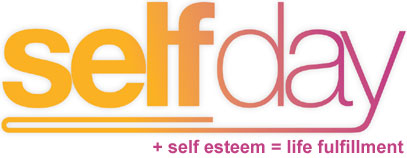Making a Difference
 International Self Esteem Day
International Self Esteem Day
Celebrate this annual awareness day with family, friends and associates.
Statistics reveal 95% of children and adults experience lack of confidence, self belief or low self esteem sometime in their life. Those individuals who have overcome their challenges, were fortunate to have their confidence boosted by a family, work colleague, a sports coach or even a passing stranger who has encouraged and steered them onwards to success
With the current economic climate, people in businesses, family, schools and communities are experiencing challenges. With each of us responsible for our thoughts, this is an opportunity for everyone, especially adults to analyse their thinking and re-set strategies to ensure they remain positive, confident membersof society and passing on the positive thinking to their children and sphere of influence.
Whether during childhood or adult life…low self-esteem can be soul destroying. The trick is learning to overcome it. Some do and some do not, instead carrying around debilitating thoughts about their own self worth for the rest of their lives, revealing, itself during addictive and negative habits.
With your thoughts unable to be operated on and unseen in an x-ray, so there is no cut and paste like on a computer. Your only solution is stopping the negative thoughts and replacing them into positive ones. If people do not they never live to their ability and potential.
Starting as babes in arms, the best key is unconditional love, guidelines about acceptable and unacceptable behaviour, understanding and teaching children at their different stages of development and praise for their achievements. With their brains soaking up their thirst for knowledge they are learning the most in their first few years of life. They learn to move, crawl, walk, skip and hop, make their sounds turn into words and then sentences, make a mark and create lines, shapes and paintings recognizable by adults, so there are plenty of opportunities for building a child’s esteem, by their parents.
During school years, life mastery continues forming the basis of their adolescent years. That’s when the tell tale signs of low esteem turn into negative actions. Using data from a 10 year study by Richie Poulton and his team, from the Dunedin Multidisciplinary Health and Development Research Unit, discovered that adolescent with poorer mental and physical health had higher levels of criminal behaviour compared to those of adolescents with high self esteem. They summed up, saying that interventions designed to raise self esteem can have beneficial consequences in reducing violence and improving mental health.
But it’s not just our youth. Once in the workplace, adults with low self esteem are less likely to perform to their ability. Held back by lack of confidence, fearful of ridicule and rejection, their thoughts transmit messages of ‘I’m no good’ ‘I’ll never get it right’, “I don’t deserve’ and other negative thoughts.
Additionally, some people ‘thrive’ on the misfortunes of others. If they can entice those through bullying tactics, they create their egotistical feelings of superiority at the consequence of others, which in itself demonstrates a shoddier malfunction in their thinking….and low self esteem.
Along with our aging generation, ‘home alone’ pensioners and grandparents, baby boomers being replaced at work by younger people and maturity instead of bringing wisdom, bringing loneliness and despair, there could be deemed a rise in low esteem within the mature population as well.
A study by Richard T Lovelace in 2003 further reveals that those with high self-esteem were better able to handle stress than those with low self-esteem. More and more studies world-wide are endorsing the importance of having a good level of esteem and self belief.
Those with high esteem had other people supporting and encouraging them sometime during their lives, until they learnt to become self reliant. Therefore, there comes a time in life when these confident, successful people need to start to help others, just as they had received.
Therefore the question arises, how do you create high esteem? If you think of a roller coaster ride, some people love it and others hate it. Feelings and our interpretation of them, happen in a nanosecond within our body. If your heart races at the excitement of a roller coaster ride or races at the fear of a roller coaster ride, it is pre-supposed that exciting and scary are the same feelings. If that is the case, then the interpretation lies in the individuals mind.
Consequently reprogramming of your thoughts about fear and excitement and all your other negative thoughts is necessary to boost your esteem. Those that don’t, let fear of the unknown rule their lives, versus, the excitement of achievement. Terrible and negative things happen to everyone but the winners in life are the people that have learnt to overcome their negative thoughts about them.
With change constant in our lives, every part of society is engulfed in the need for us to learn, and with that comes stress. We no sooner master the keys on ournew mobile and it is discarded for a new one with additional gadgets and tools that do not operate like our previous phone.
With younger people losing the connection with the outdoors and relying on technology to give them an adrenaline buzz it’s easy to become removed from personal interaction with other people. When they are out socializing, their actions are overshadowed with the misconception that drugs are necessary to enjoy life. A bungee jump might just be as good!
So, what can we do to help ourselves, work colleagues, families and country.
With New Zealand’s 6th National Self Esteem day on 24th June, it’s time to shuffle our thinking. Janice Davies, New Zealand’s representative on the International Council of Self-Esteem started celebrating this day because it’s an idea whose time has come. It’s a world first, she says and with our pioneer and entrepreneurial spirit and with New Zealand being the first country daily to greet each new day, it is fitting for the day to be founded and commence here.
Janice is encouraging people to do the following with children, family, friends and colleagues:
- 5 Activities to boost their own esteem e.g. Exercise
- 5 Activities to boost another person’s esteem e.g. Give compliment
- 1 or more activity to help the community e.g. Pick up one piece of rubbish
But the key is, she says, once you have tried it and like it and experience the ‘feel good’ factor for yourself, continue the activities and incorporate them into your daily life. Then, like other winners, you too can achieve your potential and start encouraging others as well. Here are ten additional tips.
- Stop comparing yourself with other people and stop putting your self down.
- Use affirmations to boost your self-esteem.
- Associate only with positive focused people who you can learn from.
- Learn to be still. The average person doesn't spend 30 minutes a month in total silence.
- Make a list of your positive qualities, start at ten increase to 100.
- Take up an exercise program - you will feel better and look better!
- Remember good things people have said about you and write them down
- Make any changes that help you e.g. appearance, hair style, friends, foods or behaviour.
- Eat healthy food and stay away from diets that you always fail. Instead join a group or change your lifestyle where you can succeed.
- Change negative thoughts to positive thoughts by focusing on the positive ones. Your mind can only think of one thought at a time. Make it a positive one!
Additional tips, articles, 125 Tip Ebook and one page success journal are available for free and download on www.internationalselfesteem.com
Janice Davies is The Attitude Specialist, who teaches people to be positive
and empower themselves. As a Professional Speaker, Success Coach and author
Janice educates people at conferences, workshops and through books. Janice
is the founder of the global movement International Self Esteem annual awareness
day and features in the new True Happiness DVD.
Janice has online products featuring attitude,
goals, stress, happiness, relationships and more.
Or contact Janice for your coaching needs on 021 514 511, 09 424 8400 or janice@attitudespecialist.co.nz.
SUBSCRIBE TO OUR NEWSLETTER
Visit Janice’s Websites
International SelfDayYour Online Help Guide
Other Motivational Resources
Revamp Yourself DVDComplimentary Downloads
Motivational Year Calendar...
Attitude Poem...
Attitude
4 Success Report...
Attitude Workplace Report...
Dealing with
Disengaged
Employees Report...
Success Coaching Course...
Self
Esteem Course...
Success
Journal...
Breast Cancer
Raising funds for Janice's sister's breast cancer $86,000 Herceptin Drug expense...







